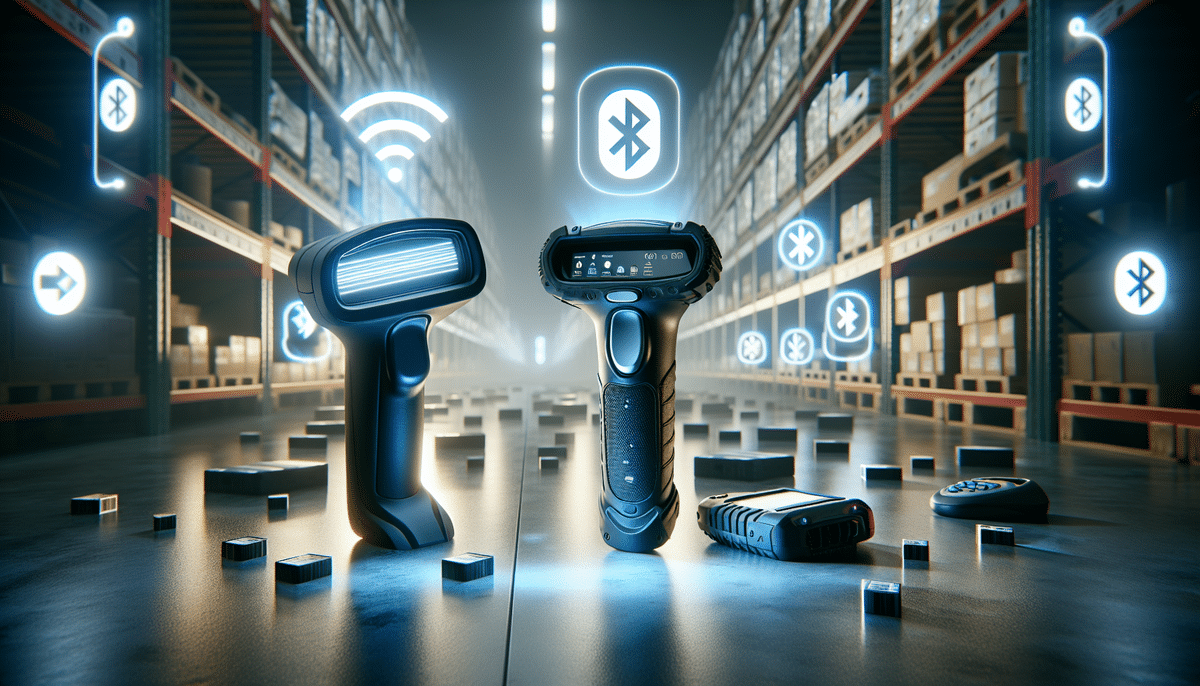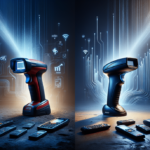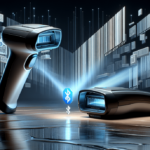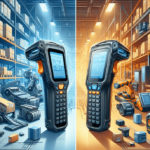Socket Mobile S700 vs Honeywell Granit 1911i: Comprehensive Comparison
Introduction
When selecting a barcode scanner for your business, it's essential to choose a device that aligns with your operational needs. Two of the most reputable options in the market are the Socket Mobile S700 and the Honeywell Granit 1911i. This comparison delves into their features, performance, and suitability for various business environments to help you make an informed decision.
Design and Build Quality
Socket Mobile S700
The Socket Mobile S700 boasts a sleek and lightweight design, making it ideal for environments where mobility and ease of handling are paramount. Key design features include:
- Large Scan Button: Easily accessible and responsive, allowing for quick scans.
- Sleek Appearance: Modern curved shape with a durable, antimicrobial coating to reduce germ transmission.
- Rechargeable Battery: Provides up to 16 hours of continuous use, suitable for long shifts.
Honeywell Granit 1911i
The Honeywell Granit 1911i is engineered for rugged industrial use, featuring a robust build that can withstand harsh conditions. Its design highlights include:
- Rugged Housing: IP65-rated for dust and water resistance, ensuring durability in extreme environments.
- Bright LED Light: Enhances barcode visibility in low-light settings.
- Extended Scanning Range: Capable of reading barcodes from up to 50 feet away, increasing operational flexibility.
Performance
Scanning Speed
- Socket Mobile S700: Delivers rapid scanning speeds of up to 100 codes per second, ensuring quick data capture.
- Honeywell Granit 1911i: Offers efficient scanning at up to 50 codes per second, complemented by its extended range capabilities.
Durability and Resistance
- Honeywell Granit 1911i: With an IP65 rating, it provides superior protection against dust and water, and can withstand drops from heights up to 6.5 feet.
- Socket Mobile S700: Features an IP54 rating, offering adequate protection against dust and splashes, and can survive drops from up to 4 feet.
For industries such as manufacturing and logistics, where equipment is frequently exposed to rough conditions, the Honeywell Granit 1911i stands out as the more resilient option.
Battery Life and Connectivity
Battery Life
The Socket Mobile S700 is equipped with a rechargeable battery that supports up to 16 hours of continuous scanning. Its replaceable battery design ensures minimal downtime. In contrast, the Honeywell Granit 1911i offers a battery life of up to 14 hours. However, its non-replaceable battery design may require more frequent charging or device replacement over time.
Note: Actual battery performance may vary based on usage patterns and environmental conditions.
Connectivity
The Socket Mobile S700 utilizes Bluetooth connectivity, allowing for seamless wireless integration with smartphones and tablets. It also supports USB charging, enhancing its versatility. Conversely, the Honeywell Granit 1911i relies on a USB cable for a stable and consistent connection, which is crucial in environments where wireless interference is a concern.
While Bluetooth offers greater flexibility, the USB connection of the Honeywell Granit 1911i ensures a more reliable link, making it preferable in settings where connectivity stability is essential.
Durability
Durability is a critical factor when selecting a barcode scanner, especially for industrial applications:
- Socket Mobile S700: Designed for light to medium usage, it is well-suited for retail environments and tasks that require frequent mobility.
- Honeywell Granit 1911i: Built for heavy-duty industrial use, it excels in construction sites, manufacturing plants, and other demanding settings where resilience to shocks, drops, and environmental factors is necessary.
The Honeywell Granit 1911i's superior build quality ensures long-term reliability in challenging conditions, whereas the Socket Mobile S700 offers sufficient durability for less demanding applications.
Ease of Use
Both scanners prioritize user experience, but they cater to different operational needs:
Socket Mobile S700
- Large scan button for effortless operation.
- Intuitive user interface with easy configuration options.
- Wireless connectivity reduces cable clutter and enhances mobility.
Honeywell Granit 1911i
- Ergonomic design with a prominent scan trigger for comfortable handling.
- Bulkier and heavier build may require adaptation for users accustomed to lighter devices.
The longer battery life of the Socket Mobile S700 also contributes to its ease of use by minimizing the need for frequent recharging, thereby streamlining daily operations.
Pricing
Cost is a significant consideration when choosing a barcode scanner:
- Socket Mobile S700: Positioned as an affordable option, it offers excellent value for small businesses and retailers seeking efficient scanning without a hefty investment.
- Honeywell Granit 1911i: Priced higher due to its advanced features and rugged design, it represents a worthwhile investment for businesses in industrial sectors that demand high durability and performance.
When evaluating pricing, businesses should consider the initial cost in relation to the long-term benefits and the specific operational requirements to determine the most cost-effective solution.
Conclusion and Recommendations
Both the Socket Mobile S700 and the Honeywell Granit 1911i are exceptional barcode scanners tailored to distinct business needs. The Socket Mobile S700 is ideal for environments that prioritize mobility, ease of use, and extended battery life, making it a perfect fit for retail and service industries. On the other hand, the Honeywell Granit 1911i’s robust construction and reliable performance under harsh conditions make it the preferred choice for industrial applications such as manufacturing, logistics, and construction.
Ultimately, the decision should be based on your business's specific requirements, including the operational environment, durability needs, connectivity preferences, and budget constraints. Assessing these factors will ensure the selection of a barcode scanner that enhances efficiency and productivity within your organization.
How to Choose the Right Barcode Scanner for Your Business Needs
Selecting the appropriate barcode scanner involves evaluating several key factors:
- Size and Weight: Ensure the scanner is comfortable for prolonged use.
- Scanning Range: Choose a device that meets the required distance for barcode reading.
- Battery Life: Opt for a scanner with sufficient battery longevity to cover operational hours without frequent recharging.
- Connectivity: Decide between wireless (Bluetooth) and wired (USB) connections based on your work environment and mobility needs.
- Durability: Ensure the scanner can withstand the physical demands of your workplace, including resistance to dust, water, and impacts.
- Barcode Compatibility: Verify that the scanner is compatible with the types of barcodes used in your operations, including 1D and 2D formats.
Thorough research and alignment of these factors with your business objectives will facilitate the selection of a barcode scanner that optimizes your workflows and operational efficiency.
The Benefits of Using a Barcode Scanner in Your Business
Integrating barcode scanners into your business operations offers numerous advantages:
- Increased Efficiency: Accelerates processes such as inventory management, sales transactions, and order fulfillment.
- Enhanced Accuracy: Minimizes human errors associated with manual data entry, ensuring reliable data capture.
- Improved Productivity: Frees up employee time, allowing staff to focus on more critical tasks.
- Inventory Tracking: Provides real-time visibility into stock levels and movements, aiding in effective inventory control.
- Sales Monitoring: Offers accurate and immediate sales data, facilitating informed decision-making.
- Better Customer Experience: Speeds up checkout processes and reduces wait times, enhancing overall customer satisfaction.
How to Properly Maintain Your Barcode Scanner for Optimal Performance
Proper maintenance is essential to ensure the longevity and reliable performance of your barcode scanner. Follow these best practices:
- Regular Cleaning: Gently wipe the scanner with a soft, damp cloth to remove dirt and debris.
- Protective Storage: When not in use, store the scanner in a protective case to prevent damage.
- Avoid Harsh Environments: Keep the device away from extreme temperatures, moisture, and corrosive substances.
- Handle with Care: Prevent drops and impacts by handling the scanner gently, especially in busy work environments.
- Firmware Updates: Regularly update the scanner’s firmware to enhance functionality and security.
Avoid using abrasive cleaners or solvents, as they can damage the scanner’s components and surface finishes.
The Future of Barcode Scanners: What to Expect in the Coming Years
Barcode scanner technology continues to evolve, with several advancements on the horizon:
- Augmented Reality (AR): Integration of AR can improve scanning accuracy and provide enhanced user interfaces.
- Voice-Activated Scanning: Enables hands-free operation through voice commands, increasing efficiency in fast-paced environments.
- Advanced Analytics: Utilization of data analytics to gain deeper insights into scanning operations and optimize workflows.
- Artificial Intelligence (AI) and Machine Learning: Enhances scanning capabilities and facilitates predictive maintenance, reducing downtime.
These innovations are set to further streamline business operations, enhance data accuracy, and improve overall productivity.
Top Industries That Use Barcode Scanners for Efficient Operations
Barcode scanners are integral to a wide range of industries, each leveraging the technology to enhance operational efficiency and accuracy:
- Retail: Manages inventory, processes sales transactions, and enhances customer service through quick and accurate scans.
- Healthcare: Tracks patient information, manages medication distribution, and ensures the accuracy of medical records.
- Logistics: Monitors shipments, manages inventory levels, and optimizes supply chain operations.
- Manufacturing: Tracks supplies, oversees production processes, and reduces waste through precise inventory management.
- Warehousing: Organizes storage, manages stock levels, and facilitates efficient order fulfillment.
Each industry benefits from the accuracy, speed, and reliability that barcode scanners bring to their specific operational workflows.






















